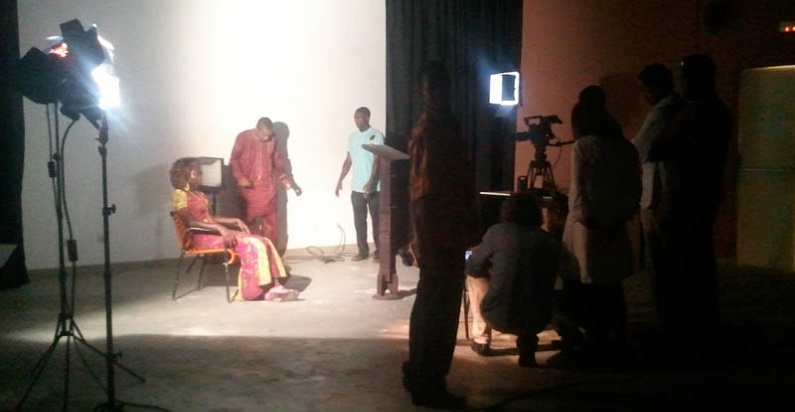-
06 October 2014
Category : Opinion
Quiet on the set… Filming in Niger
Diez jóvenes nigerinos han sido formados en producción audiovisual de anuncios para televisión y videoclips con un taller del programa cultural ACERCA de la AECID y que ha contado con el apoyo de la FIIAPP.Ten young Nigeriens were trained in audio-visual production of television advertisements and video-clips in a workshop organized by the ACERCA cultural programme of the AECID and supported by the FIIAPP.

A TV ad for an airline and a video clip for a Nigerien singer. These were just two of the projects brought to life by a group of ten Nigeriens after a month of training in audio-visual production under the umbrella of the ACERCA cultural programmeof the Spanish Agency for International Development Cooperation (AECID). Training opportunities in this sector in Niger are not abundant and the workshop was free of charge. Result of the demand: a waiting list. The ten students selected for the workshop, all professionals in the audio-visual and journalism sector, were trained in scouting shooting locations, staging, filming and editing.
This programme, with the support of the FIIAPP, has been promoting culture as an engine of development for the past decade. “After completing the training, I think that we will be able to produce professional video clips of local artists, and also advertisements on the same level as international ones”, explains Mohamed Elquedir, a 33-year-old workshop participant. This translates, for example, into the production of television advertisements with a duration of one minute or less than 60 seconds, shorter than the ones being produced up to now.
This workshop was conceived of as a way to leverage Nigerien human capital in this area and to respond to local demand. “In Africa in particular, there is a very evident interest in building bridges, especially with Europe, where production companies often have relationships with local African film production companies and where there is a large audience. Cinema for many of these countries is still a very minimal portion of Gross National Product (GNP), but it offers great potential through new technologies, as in the case of Niger: social networks, advertising, television…”, explains Guillermo Escribano, Head of the Department of Cooperation and Cultural Promotion of the AECID.
Culture, a tool of cooperation
The FIIAPP joined this programme because it considers culture to be another working tool for promoting social cohesion and economic development in countries like Niger. “We are promoting the power of culture as an engine of development, of combating poverty and social exclusion”, indicates Isabel Ramos, Director of Special Programmes of the FIIAPP.Mohamed and his colleagues showed great interest during the workshop last September. “The students are motivated because they were pre-selected, as there was not space for everyone because of the stipulation that the group had to be limited to 15 people to better organize the workshop, explains Eric Rivot, the instructor and member of the production company responsible for designing the content, Termites Films. Rivot also highlights the democratic and participatory nature of the course, which includes collective decision-making and the selection of topics and filming locations of the final workshop projects. If both projects are approved, the work of these students will start appearing on television.
The ACERCA programme will continue its activities and, from now on, will enjoy the support of the FIIAPP to continue promoting culture as an engine of development all over the world.
You can hear the words of Mohamed and the rest of the protagonists in this story on the FIIAPP’s radio programme “Public cooperation around the worldon Radio 5, All News (RNE).
The views and opinions expressed in this blog are the sole responsibility of the person who write them.





